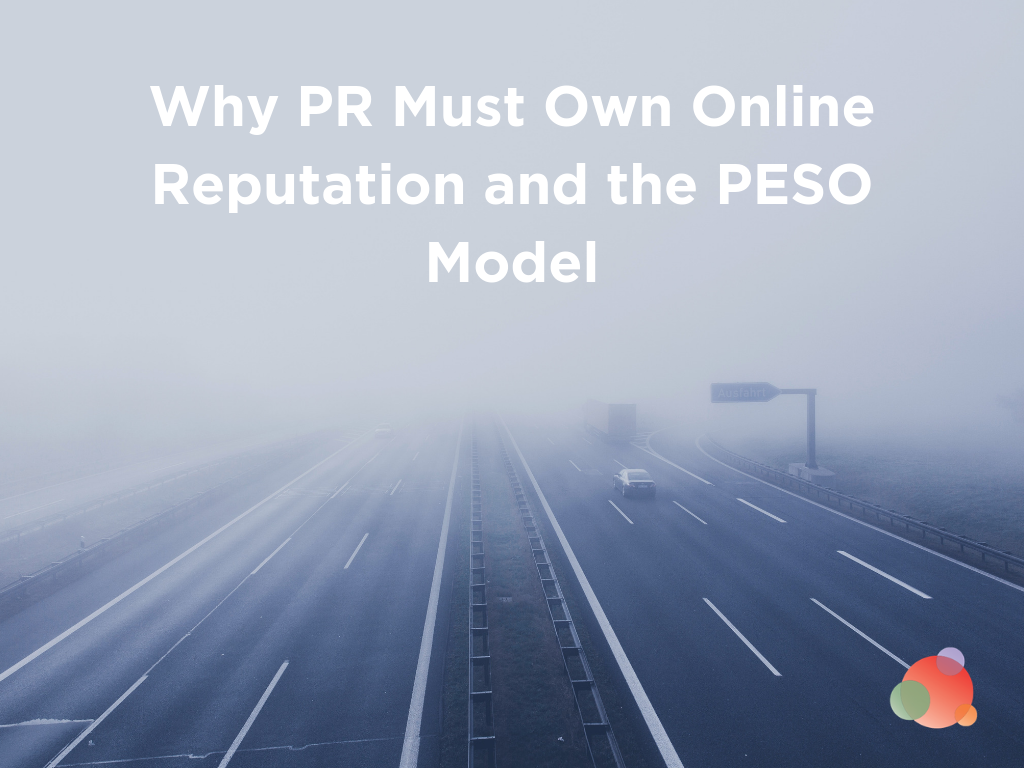 I recently spoke about reputation management at the PRSA Western District Conference in Phoenix.
I recently spoke about reputation management at the PRSA Western District Conference in Phoenix.
I had a chance to hear my dear friend and occasional co-conspirator Gini Dietrich muse about the future of public relations, as the worlds of PR and marketing continue to converge.
As the originator of the acclaimed PESO model for integrating paid, earned, shared, and owned media, the blurring boundaries between PR and marketing have Gini worried.
They concern me, too.
For slightly different, but very related reasons.
I Know There’s a Fine Line Around Here Somewhere
A 2017 report from USC’s Annenberg Center for Public Relations noted that 60% of PR and marketing executives saw their domains becoming one by 2022.
With three years to go, not much has changed.
According to this year’s report, 60% of marketing executives still believe PR and marketing will be more closely aligned, while roughly half of PR pros feel the same way.
(Whether the difference suggests active resistance on the PR side or merely wishful thinking, remains to be seen.)
Where Have All the Experts Gone?
Lately, Gini and I have both started to notice that SEO consultants are claiming expertise in earned media.
But what they’re selling is mainly link acquisition, not media relations as we would define it.
And calling it earned media is not completely wrong.
Meanwhile, online reputation repair firms are touting their ability to create content.
They use this to flood search engines in hopes of suppressing results their clients find unsavory.
But neither SEO agencies nor online reputation repair firms are doing these activities very well.
Because it’s not what they know.
From what I see, much of what they pass off as “content” is probably doing their clients more harm than good.
This, Gini argues, is why PR, not marketing, needs to own PESO.
Reputation Repair is a Long Game
As I said, I was at the Western District conference to speak about managing online reputation.
In my talk, I addressed why entrusting this fragile organizational asset to self-proclaimed experts with a mythical magic eraser for Google is—if you’ll excuse the technical jargon—a freaking lousy idea.
Lately, I’ve been talking about this topic a lot.
It seems like I can’t go a week without encountering yet another horrifying example of questionable SEO tactics gone awry, and leaving some entity thousands of dollars poorer, and with an even bigger online mess to clean up.
Granted, cleaning up reputational messes is what I do.
But it still bugs me.
And what bothers me even more, is seeing otherwise sophisticated organizations continue to fall for the fantastical and often technically preposterous promises of “reputation repair” companies that are either short on experience or long on chutzpah.
Or both.
It shouldn’t be happening.
And from where I sit, it’s only going to get worse.
This is not to suggest that all online reputation consultants and SEO providers are cut from the same cloth.
Unfortunately, finding the experienced, well-intentioned advisers, who promise only what they know they can deliver, is much easier said than done.
If there’s anything the black-hat operators know how to do quite well, it’s getting themselves found on Google.
If they invested similar time and attention to curating their clients’ online reputations, I’d be looking for something else to talk about.
Alas, that’s not their model.
Chicanery is a volume business.
But I digress.
PESO is Essential for Managing Online Reputation
Gini was scheduled to speak right before me, a time I ordinarily reserve for nervous pacing.
But I was more than a little interested in hearing what she had to say.
If there’s one thing she and I violently agree on, it’s that PESO, all its integrated glory, is essential to building and sustaining a powerful reputation—both online and off.
The whole point of my presentation was that managing online reputation, like managing reputation anywhere else, is and will always be the rightful province of PR.
Public relations–not marketing, IT, or <shudders> legal–needs to own it.
Think about it.
Who better to produce credible, high-quality owned content than innate storytellers grounded in the principles of objective journalism?
Is there a discipline more qualified to use shared (aka social) media to build relationships, than the one that has “relations” right in its name?
Paid Social Belongs in PR
Paid advertising is still seen as marketing’s turf.
But, paid media under the PESO model involves things that are arguably much more closely related to PR than advertising.
One more thing.
Marketers caught their very first glimpse of the PESO model when Gini’s second book, Spin Sucks, came out in 2014.
PR pros have been applying and perfecting the building blocks of PESO for years.
It’s what we know.
PR pros need to own online reputation to protect the organizations and clients we serve.
And that means PR must own PESO, too.
Where do you stand on the debate about PR versus marketing leading PESO? Tell us your comments below.
Watch the Spin Sucks PESO 2.0 Masterclass for FREE and learn how to implement the PESO model to achieve unparalleled communications results.
Watch PESO 2.0 Masterclass NOW
Photo by Markus Spiske on Unsplash